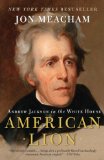Summary | Excerpt | Reviews | Readalikes | Genres & Themes | Author Bio

Andrew Jackson in the White House
by Jon Meacham
“You must not make yourself unhappy about us, my dear Mother,” Emily added, sending warm wishes to her father. The handwriting was shaky as the letter ended; the water was rough, the pace of the craft fast. “I hope you will excuse this scrawl,” Emily said, “as it is written while the boat is running.”
The speed of the boat did not seem to bother Andrew Jackson, but then he was accustomed to pressing ahead. He was constantly on the run, and had been all his life. For him the journey to the White House had begun six decades before, in a tiny place tucked away in the Carolinas–a place he never visited, and spoke of only sparingly, called Waxhaw.
Jackson grew up an outsider, living on the margins and at the mercy of others. Traveling to America from Ireland in 1765, his father, the senior Andrew Jackson, and his mother, Elizabeth Hutchinson Jackson, moved into a tiny community a few hundred miles northwest of Charleston, in a spot straddling the border between North and South Carolina. “Waxhaw” came from the name of the tribe of native Indians in the region, and from a creek that flowed into the Catawba River. Though the Revolutionary War was eleven years away, the relationship between King George III and his American colonies was already strained. The year the Jacksons crossed the Atlantic, Parliament passed the Quartering Act (which forced colonists to shelter British troops) and the Stamp Act (which levied a tax on virtually every piece of paper on the continent). The result: the Massachusetts legislature called for a colonial congress in New York, which issued a “Declaration of Rights and Grievances” against King George III. Striking, too, was a remark made by a delegate from South Carolina, the Jacksons’ new home. “There ought to be no more New England men, no New Yorkers,” said Christopher Gadsden of Charleston, “but all of us Americans!”
Jackson’s father, meanwhile, was trying to establish himself and his family in the New World. Though a man, his son recalled, of “independent” means, he was, it seems, poorer than his in- laws, who might have made him feel the disparity. While the other members of the extended family began prospering, Jackson moved his wife and two sons, Hugh and Robert, to Twelve Mile Creek, seven miles from the heart of Waxhaw. His wife was pregnant when the first Andrew Jackson died unexpectedly. It was a confusing, unsettling time. The baby was almost due, a snowstorm–rare in the South–had struck, and Jackson’s pallbearers drank so much as they carried his corpse from Twelve Mile Creek to the church for the funeral that they briefly lost the body along the way.
Soon thereafter, on Sunday, March 15, 1767, Mrs. Jackson gave birth to her third son, naming him Andrew after her late husband. He was a dependent from delivery forward. Whether the birth took place in North or South Carolina has occupied historians for generations (Jackson himself thought it was South Carolina), but the more important fact is that Andrew Jackson came into the world under the roof of relatives, not of his own parents. Growing up, he would be a guest of the houses in which he lived, not a son, except of a loving mother who was never the mistress of her own household. One of Mrs. Jackson’s sisters had married a Crawford, and the Crawfords were more affluent than the Jacksons. The loss of Mrs. Jackson’s husband only made the gulf wider. When the Crawfords asked Mrs. Jackson and her sons to live with them, it was not wholly out of a sense of familial devotion and duty. The Jacksons needed a home, the Crawfords needed help, and a bargain was struck. “Mrs. Crawford was an invalid,” wrote James Parton, the early Jackson biographer who interviewed people familiar with the Jacksons’ days in Waxhaw, “and Mrs. Jackson was permanently established in the family as housekeeper and poor relation.” Even in his mother’s lifetime, Jackson felt a certain inferiority to and distance from others. “His childish recollections were of humiliating dependence and galling discomfort, his poor mother performing household drudgery in return for the niggardly maintenance of herself and her children,” said Mary Donelson Wilcox, Emily and Andrew’s oldest daughter. He was not quite part of the core of the world around him. He did not fully belong, and he knew it.
Excerpted from American Lion by Jon Meacham Copyright © 2008 by Jon Meacham. Excerpted by permission of Random House, a division of Random House, Inc. All rights reserved. No part of this excerpt may be reproduced or reprinted without permission in writing from the publisher.




If you want to build a ship, don't drum up people... but rather teach them to long for the endless immensity of the...
Click Here to find out who said this, as well as discovering other famous literary quotes!
Your guide toexceptional books
BookBrowse seeks out and recommends the best in contemporary fiction and nonfiction—books that not only engage and entertain but also deepen our understanding of ourselves and the world around us.